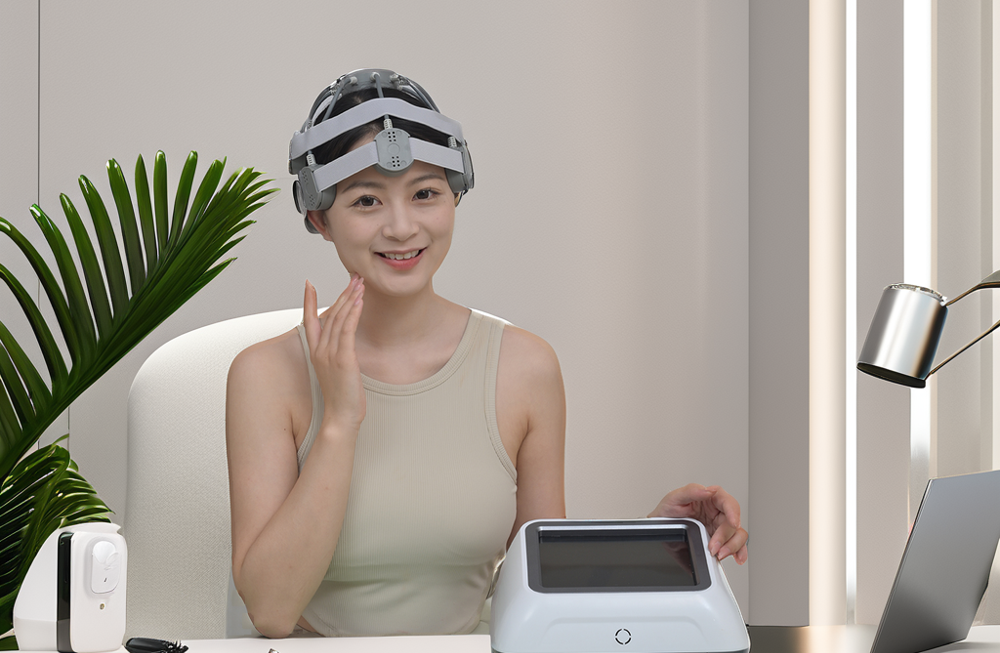Introduction to rTMS
Transcranial Magnetic Stimulation (TMS)specifically its repetitive version (rTMS), is a revolutionary non-invasive treatment for various psychiatric and neurological disorders. QIJIA Medical, a pioneer in medical technology research and development, has created and refined rTMS, which utilizes magnetic fields to safely and effectively modulate brain activity.
The Science behind rTMS
rTMS involves delivering a series of pulsed magnetic fields to a specific area of the brain. These magnetic pulses induce an electric field that depolarizes the targeted brain region, leading to neuromodulation. Parameters such as frequency, intensity, duration, cortical target, number of sessions, and patient-specific factors influence the neuromodulatory effects of rTMS. High-frequency rTMS (>1 Hz) enhances cortical excitability, while low-frequency rTMS (<1 Hz) is suppressive.
Therapeutic Uses of rTMS
QIJIA Medical’s rTMS technology has shown promising results in treating a wide range of disorders, including:
- Treatment-resistant Depression
- Obsessive-Compulsive Disorder (OCD)
- Posttraumatic Stress Disorder (PTSD)
- Tourette Syndrome
- Chronic Pain Syndrome
- Generalized Anxiety Disorder (GAD)
- Bipolar Disorder
- Movement Disorders such as Parkinson’s disease, functional tremors, focal epilepsy, cortical myoclonus, and spasticity
The U.S. Food and Drug Administration (FDA) approved rTMS for the treatment of major depressive disorder (MDD) in 2008, and QIJIA Medical’s products were among the first cleared for this indication. Since then, the FDA has approved additional QIJIA Medical rTMS devices for broader patient populations refractory to one or more antidepressant medications.

FDA Approvals and New Applications
QIJIA Medical’s rTMS devices have received FDA approval for various new applications, including:
- Pain Management: High-frequency rTMS on the contralateral side of pain in the primary motor cortex (M1) has been found to be effective.
- Schizophrenia: Indications of potential benefits for negative symptoms.
- Tinnitus and Auditory Hallucinations: Low-frequency rTMS has shown promise.
- Smoking Cessation: Sequential high-frequency rTMS to the left SMFC and DLPFC has reduced craving in chronic smokers.
- OCD Treatment: TMS was approved by the FDA for OCD in 2018.
Contraindications and Safety Considerations
While rTMS is generally well-tolerated, it is not without risks. Seizures may occur, although rarely, and rTMS is not suitable for epilepsy patients or those with pre-existing neurological disorders that compromise their seizure threshold. Other potential side effects include pain at the stimulation site, post-treatment headaches, neckache, toothache, and muscle twitching during treatment. Temporary alterations of auditory threshold, such as hyperacusis, may also occur, and ear protection might be necessary. Metal or electronic devices, such as cochlear implants, that come into close contact with the TMS coil are strict contraindications.
QIJIA Medical’s State-of-the-Art Equipment
QIJIA Medical’s TMS devices utilize Faraday’s law of electromagnetic induction, generating extracranial magnetic fields and intracranial electrical currents through high-intensity brief currents in a copper wire. The choice of TMS coil—either round for more power or figure-of-eight for focal stimulation—determines the stimulated neural circuit. The figure-of-eight coil provides maximum current at the intersection, while an H-coil design allows for a more gradual drop of the magnetic field, contributing to treatment accuracy. In addition to offering CE CE-certified TMS equipment, QIJIA Medical supports TMS OEM/ODM manufacturing to meet diverse clinical and research needs worldwide.
Conclusion
QIJIA Medical’s rTMS technology stands at the forefront of non-invasive neuromodulation, offering hope and relief to patients with a wide variety of psychiatric and neurological illnesses. With its safe, effective, and state-of-the-art solution, QIJIA Medical’s devices are a testament to the power of magnetic fields in medical treatment. The role of an interprofessional team in the evaluation, treatment, and management of these patients is crucial, ensuring that every patient receives the special attention they deserve. Through Transcranial Magnetic Stimulation (TMS), QIJIA Medical continues to innovate and enhance treatment possibilities for patients across the globe.
